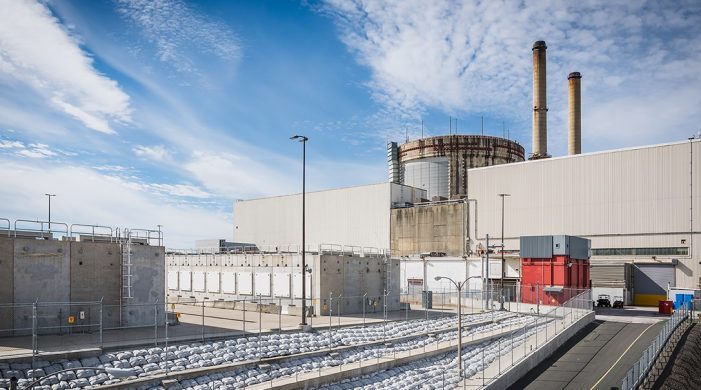By Jim Saunders, The News Service of Tallahassee
TALLAHASSEE — It would take years, possibly decades. But Florida is looking at the possibility of adding nuclear power.
After state lawmakers this year required a study on the feasibility of expanding the use of nuclear energy, Florida Public Service Commission staff members Thursday met with experts and electric-industry officials to discuss what is known as “advanced” nuclear technology.
Myriad questions remain about issues such as costs and regulations. Also, future nuclear might not look like past nuclear. While advanced technology could include large nuclear plants, it also could involve small reactors that might be used by the military or industries.
It’s not just Florida studying the issue. The Biden administration said in May it was forming a working group as part of a goal of “delivering an efficient and cost-effective deployment of clean, reliable nuclear energy and ensuring that learnings translate to cost savings for future construction and deployment.” Also other states have been looking at advanced nuclear technology.
Lauren Sher, senior director for development at Florida Power & Light who chairs a nuclear working group for the Florida Electric Power Coordinating Group, described the Florida study as a “long-term view and a long game.”
“We think that this will help tee up these opportunities over the next several decades,” Sher said during Thursday’s meeting.
Jacob Williams, general manager and CEO of the Florida Municipal Power Agency and chairman of the Florida Electric Power Coordinating Group, said the state needs to diversify its energy sources, as about 75 percent of electricity is generated with natural gas. While utilities continue to build solar facilities, Williams said nuclear power could be important in meeting future needs.
“Florida sits like a sore thumb. We are the most dependent (part of the country) on a basically single source of electricity,” Williams said.
Thursday’s meeting was the first formal step as the Public Service Commission carries out a legislative directive to submit a report by April about the possibility of using advanced nuclear technology. That includes the possibility of adding nuclear power at military bases.
Lawmakers included the nuclear-power study in a bill (HB 1645) that drew attention for higher-profile issues such as eliminating references in state law to reducing greenhouse-gas emissions and barring offshore wind-energy production.
Nuclear plants generate about 13 percent of Florida’s electricity, according to a state House analysis, with Florida Power & Light operating the St. Lucie and Turkey Point plants.
But the state hasn’t had new nuclear plants since the 1970s and 1980s. Also, Duke Energy Florida decided in 2013 to permanently shut down a Crystal River nuclear plant that had sustained damage in a containment building.
Cayce Hinton, director of the commission’s Office of Industry Development and Market Analysis, said Thursday the study will look at a variety of technologies. That includes large-scale reactors, known as AP1000 reactors, similar to generating units that began operating in 2003 and this year at a power plant in Georgia.
But Mary Lou Dunzik-Gougar, a professor of nuclear engineering at Idaho State University, said technology also could include much-smaller reactors that would be more versatile. That includes “microreactors” that would fit on the backs of trucks and could be deployed quickly by users such as the military.
Hinton asked Dunzik-Gougar about safety, what he described as the “elephant in the room.”
“In layman’s terms, are we comfortable that a small modular reactor on the back of a truck being used in a mobile fashion, that we’re not looking at radiological disasters?” Hinton asked.
“You mean, like a mobile Chernobyl?” Dunzik-Gougar joked.
But she said nuclear has proven to be a safe source of electricity.
“We already know nuclear is the safest, and it’s not going to be changed by having a very small reactor on a truck,” Dunzik-Gougar said. “You can talk about transporting any sort of fuel, same idea, there’s risk, but it’s actually pretty much less with nuclear.”


Nuclear is the way to go or the Thorium reactors if they can be developed past the prototype stage. Most people still believe the lie that the nuclear plants emit radio activity they don’t but the recycling of spent fuel rods has still not been addressed but they still produce large amounts of power with minimal adverse effects on the environment. Solar and wind, besides being a blight on the landscape, are expensive, inefficient cause and major pollution to produce. Their manufacture involves components that are only available via strip mining efforts, mostly done in third world nations and China. Wind and solar require more energy to manufacture and install than they can produce in their useful lifetime and l won’t go into the number of birds that are chopped up by those huge windmill blades or the pollution caused by them leaking hydraulic fluid.
There is not current a plan for recycling worn out windmill parts or solar panels, I suspect they are being dumped into landfills or trash piles so they can leach toxic chemicals into the ground.
Read up on Thorium reactors.
Safer, much more available than uranium.
China and India (which has a large supply) are leading the research.
I have never really liked Nuclear Power, mainly because of Possible Melt Downs and what to do with all the Spent Rods. But NOW, you have to factor in all the illegals coming here unvetted and many of them are known and unknown Terrorists which makes me really not liking it. I wouldn’t actually call it the Safest form of Power, especially if if their is a small group of people with evil intent close by. If it has to be Florida, about the only place to build one would be between Live Oak, Ocala, Chiefland and Perry, somewhere in the middle. Down South is too over Populated, the Everglades, and it’s sinking.